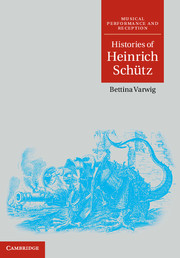Book contents
- Frontmatter
- Contents
- Abbreviations
- Music examples
- Figures
- Acknowledgments
- Introduction
- Chapter One Trumpets and drums (Psalmen Davids, 1617)
- Chapter Two Echoes, mirrors and masks (Dafne, 1627)
- Chapter Three Life, death and afterlife (Musicalische Exequien, 1636)
- Chapter Four Old and new worlds (Geistliche Chor-Music, 1648)
- Conclusion
- Chronology
- Bibliography
- Index
Chapter Two - Echoes, mirrors and masks (Dafne, 1627)
Published online by Cambridge University Press: 05 November 2011
- Frontmatter
- Contents
- Abbreviations
- Music examples
- Figures
- Acknowledgments
- Introduction
- Chapter One Trumpets and drums (Psalmen Davids, 1617)
- Chapter Two Echoes, mirrors and masks (Dafne, 1627)
- Chapter Three Life, death and afterlife (Musicalische Exequien, 1636)
- Chapter Four Old and new worlds (Geistliche Chor-Music, 1648)
- Conclusion
- Chronology
- Bibliography
- Index
Summary
As far as we can tell, the first performance of Schütz's Dafne did not cause much of a stir. Presented for the wedding of Johann Georg's daughter Sophie Eleonore and Georg II, Landgrave of Hesse, in the electoral residence of Torgau on 13 April 1627, the piece is not even mentioned by name in the Darmstadt (Hesse) court diaries; the chronicler merely confirms that ‘on Friday there were meals in the morning and in the evening, and after dinner a comedy was performed’. The Dresden records are equally brief and non-committal; the main entry reads: ‘After dinner a sung comedy was presented by the electoral chapel musicians.’ The performance of Dafne was only one among several entertainments put on during the celebrations, which lasted roughly a fortnight and included other ‘comoedien’ as well as dances, ballets, shooting contests, wolf and bear hunts, fireworks and so on. Moreover, the Darmstadt reports reveal that Dafne was played on a date when at least some of the guests from abroad had already departed. The librettist himself, the celebrated German poet Martin Opitz, remarked a few months afterwards in a letter to fellow writer August Buchner: ‘I would not want you to have seen the drama for the wedding in Torgau, if it has been done, because apart from the cantilenas the rest does not amount to much.’ Notated parts, if not a score, must have existed, but they do not survive today, and nor did Schütz decide to have the piece (or any of his other courtly entertainment works) published. Only the libretto appeared in print in 1627 and again two years later in the second volume of Opitz's Deutsche Poemata (1629).
One might conclude that Schütz simply attached less value or interest to these secular projects than to his numerous published volumes of sacred music, a reading that corresponds with the later perception of the composer as first and foremost a Lutheran church musician. Yet it seems equally likely that Dafne was something of a bold experiment, which possibly did not quite work out in the way that Schütz or his librettist envisaged it. This latter scenario not only accords with Opitz's negative assessment – expectations had been raised but the outcome fell short? – but also fits with a much-cited but opaque letter by Schütz to the Saxon court official Friedrich Lebzelter, written six years after the Dafne premiere in February 1633. Outlining his experiences from his second Italian trip in 1628–9, Schütz attests that
during my recent journey to Italy I engaged myself in a singular manner of composition, namely how a comedy of diverse voices can be translated into declamatory style and be brought to the stage and enacted in song – things that to the best of my knowledge (in the way that I mean it) are still completely unknown in Germany, and until now, because of the difficult situation, have not been practiced or furthered by us.
- Type
- Chapter
- Information
- Histories of Heinrich Schütz , pp. 58 - 108Publisher: Cambridge University PressPrint publication year: 2011



